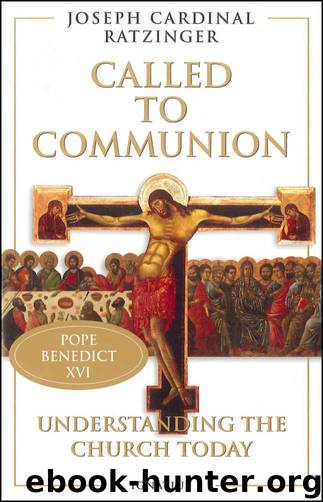Called To Communion by Ratzinger Joseph Cardinal

Author:Ratzinger, Joseph Cardinal [Ratzinger, Joseph Cardinal]
Language: eng
Format: epub
Publisher: Ignatius Press
Published: 2010-10-26T16:00:00+00:00
3. Consequences for the office and mission of the bishop
In all our reflections on the relationship between the universal Church and the particular Church, we have repeatedly encountered the figure of the bishop as a central element of the Church’s constitution. He embodies the unity and the public character of the local Church that derive from the unity of Word and sacrament, as we have said. He is at the same time the link connecting his Church to the other local Churches: just as he answers for the unity of the Church in his territory, in his diocese, it is also incumbent upon him to mediate and constantly enliven the unity of his local Church with the entire, one Church of Jesus Christ. He must be solicitous for the catholic and apostolic dimensions of his local Church: these two elements of the Church’s essence mold his office in a particular way, but they also have an immediate connection with the two other distinctive notes of the Church. Apostolicity and catholicity serve unity, and without unity there is also no holiness. This is so because without love there is no holiness, which is realized principally in the integration of the individual and of individuals into the reconciling love of the one Body of Jesus Christ. It is not the perfecting of one’s own self that makes one holy but the purification of the self through its fusion into the all-embracing love of Christ: it is the holiness of the triune God himself.
Supposing these basic ecclesiological principles, how are we to define more precisely the mission of the bishop and the status of the particular Church in the universal Church? This question introduces a broad subject, for it leads us into the domain where principles must be implemented practically in the historical situation. Although this domain always presupposes the same foundations, it constantly confronts them with new realities of human life and therefore constantly demands new answers. I must content myself here with underlining a couple of general aspects.
If the bishop is to be defined essentially as a successor of the apostles, the fundamental coordinates of his mission are determined by what Scripture says to be Jesus’ will in regard to the apostles: They are “made” that they “might be with him”, “that he might send them” and “that they might have authority” (Mk 3:14f). The basic prerequisite for episcopal ministry is intimate communion with Jesus, being with him. The bishop must be a witness of the Resurrection, hence, he must be in contact with the risen Christ. Unless the bishop is inwardly “with” Christ, unless he is Christ’s “contemporary”, he becomes a mere ecclesiastical functionary, in which case he is not a witness or a successor of the apostles. To be with the Lord requires interiorization, but at the same time it also brings about participation in the dynamism of the Lord’s mission. For the Lord is entirely the emissary who has come down from heaven in order to make his existence with the Father an existence with men.
Download
This site does not store any files on its server. We only index and link to content provided by other sites. Please contact the content providers to delete copyright contents if any and email us, we'll remove relevant links or contents immediately.
Resisting Happiness by Matthew Kelly(3341)
The Social Psychology of Inequality by Unknown(3031)
Day by Elie Wiesel(2783)
Designing Your Life by Bill Burnett(2747)
The Giving Tree by Shel Silverstein(2344)
Human Design by Chetan Parkyn(2073)
The Supreme Gift by Paulo Coelho(1978)
Angels of God: The Bible, the Church and the Heavenly Hosts by Mike Aquilina(1969)
Jesus of Nazareth by Joseph Ratzinger(1811)
Hostage to the Devil by Malachi Martin(1803)
Augustine: Conversions to Confessions by Robin Lane Fox(1772)
7 Secrets of Divine Mercy by Vinny Flynn(1746)
Dark Mysteries of the Vatican by H. Paul Jeffers(1723)
The Vatican Pimpernel by Brian Fleming(1703)
St. Thomas Aquinas by G. K. Chesterton(1634)
Saints & Angels by Doreen Virtue(1605)
The Ratline by Philippe Sands(1580)
My Daily Catholic Bible, NABRE by Thigpen Edited by Dr. Paul(1503)
Called to Life by Jacques Philippe(1481)
